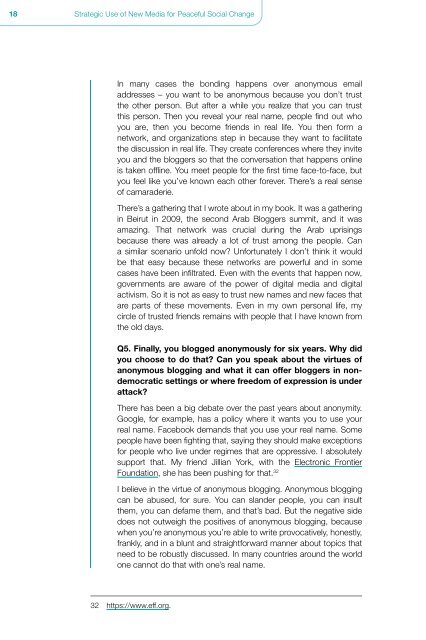Strategic Use New Media Peaceful Social Change
1Uy7LZ0
1Uy7LZ0
Create successful ePaper yourself
Turn your PDF publications into a flip-book with our unique Google optimized e-Paper software.
18<br />
<strong>Strategic</strong> <strong>Use</strong> of <strong>New</strong> <strong>Media</strong> for <strong>Peaceful</strong> <strong>Social</strong> <strong>Change</strong><br />
In many cases the bonding happens over anonymous email<br />
addresses – you want to be anonymous because you don’t trust<br />
the other person. But after a while you realize that you can trust<br />
this person. Then you reveal your real name, people find out who<br />
you are, then you become friends in real life. You then form a<br />
network, and organizations step in because they want to facilitate<br />
the discussion in real life. They create conferences where they invite<br />
you and the bloggers so that the conversation that happens online<br />
is taken offline. You meet people for the first time face-to-face, but<br />
you feel like you’ve known each other forever. There’s a real sense<br />
of camaraderie.<br />
There’s a gathering that I wrote about in my book. It was a gathering<br />
in Beirut in 2009, the second Arab Bloggers summit, and it was<br />
amazing. That network was crucial during the Arab uprisings<br />
because there was already a lot of trust among the people. Can<br />
a similar scenario unfold now? Unfortunately I don’t think it would<br />
be that easy because these networks are powerful and in some<br />
cases have been infiltrated. Even with the events that happen now,<br />
governments are aware of the power of digital media and digital<br />
activism. So it is not as easy to trust new names and new faces that<br />
are parts of these movements. Even in my own personal life, my<br />
circle of trusted friends remains with people that I have known from<br />
the old days.<br />
Q5. Finally, you blogged anonymously for six years. Why did<br />
you choose to do that? Can you speak about the virtues of<br />
anonymous blogging and what it can offer bloggers in nondemocratic<br />
settings or where freedom of expression is under<br />
attack?<br />
There has been a big debate over the past years about anonymity.<br />
Google, for example, has a policy where it wants you to use your<br />
real name. Facebook demands that you use your real name. Some<br />
people have been fighting that, saying they should make exceptions<br />
for people who live under regimes that are oppressive. I absolutely<br />
support that. My friend Jillian York, with the Electronic Frontier<br />
Foundation, she has been pushing for that. 32<br />
I believe in the virtue of anonymous blogging. Anonymous blogging<br />
can be abused, for sure. You can slander people, you can insult<br />
them, you can defame them, and that’s bad. But the negative side<br />
does not outweigh the positives of anonymous blogging, because<br />
when you’re anonymous you’re able to write provocatively, honestly,<br />
frankly, and in a blunt and straightforward manner about topics that<br />
need to be robustly discussed. In many countries around the world<br />
one cannot do that with one’s real name.<br />
32 https://www.eff.org.


